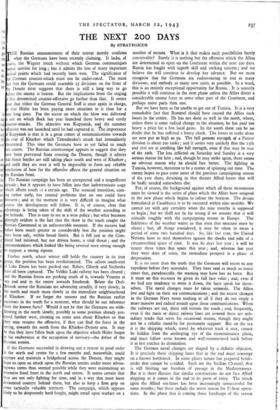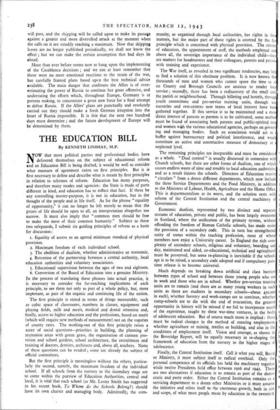THE NEXT 200 DAYS
By STRATEGICUS HE Russian announcement of their retreat merely confirms what the Germans have been recently claiming It lacks, of ourse, the Wagner touch without which German communiqués ot survive for long ; but it admits the loss of many important clic:al points which had recently been won. The significance of s German counter-attack must not be under-rated. The mere et that the Germans could assemble 25 divisions on the front of or e Donetz river suggests that there is still a long way to go ore the enemy is beaten. But the implications from the staging this determined counter-offensive go farther than that. It seems ear that either the German General Staff is once again in charge, r that Hitler has been paying more attention to it than for a it try long time. For the sector on which the blow was delivered nd s one on which Bock last year launched three heavy and costly nd ounter-attacks. His objective was Kupyansk, and the summer he 1fensive was not launched until he had captured it. Phe importance ed Kupyansk is that it is a great centre of communications towards th e rear of Kharkov which Timoshenko's attack had immediately ist hreatened. This rime the Germans have as yet failed to reach is centre. The Russian communiqué appears to suggest that they ave been prevented from crossing the Donetz, though it admits at fierce battles are still taking place south and west of Kharkov ; d until they are over it will be impossible to form any reliable or onclusion of how far the offensive affects the general situation on he Russian front.
in The Russian campaign has been an unexpected and a magnificent pisode ; but it appears to have fallen into that indeterminate stage er vhich affects youth i.t a certain age. The seasonal transition, corn- to ng rather early, has created problems that no one could have m oreseen ; and at the moment it is very difficult to imagine what of curse the development will follow. It is, of course, clear that
dvantage is being taken of the shift of the weather according to to e latitude. That is easy to see as a wise policy ; but what becomes arrngly evident is the fact that the thaw in the south caught the ussian Command at an unfavourable moment. If the success had ther been much greater or considerably less the position might ave been safe, within broad limits. But it fell just as the Corn- -)f and had initiated, but not driven home, a vital threat ; and the j mmunications which looked like being severed were strong enough
d to support a strong riposte.
Farther north, where winter still holds the country in its iron n grasp, the position has been revolutionised. The salient south-east )1 of Lake Ilmen has been pushed out. Rzhev, Ghatsk and Sychevka have all been captured. The Velikie Luki railway has been cleared ; and the Russian forces are pushing south of it, towards Vyazma at one end and in the centre towards Smolensk. Below the Drel- 1 Briansk sector the Russians are advancing steadily, if very slowly, in e the north and much more slowly in the immediate neighbourhood e of Kharkov. If we forget the seasons and the Russian earlier i successes in the south for a moment, what should be our inference from the known facts? Would it not be that the Germans are with- drawing in the north slowly, possibly to some position already pre- pared farther west, pivoting on some area about Kharkov so that they may resume the offensive, if they can find the force in the Spring, towards the north from the Kharkov-Donetz area. It may be that they have fallen back upon the objective which Hitler forgot in his exuberance at the occupation of territory—the defeat of the Russian armies.
If the Germans succeeded in drawing out a retreat in good order in the north and centre for a few months and, meanwhile, could capture and maintain a bridgehead across the Donetz, they might hope to open an attack upon the Russian armies under more advan- tageous terms than seemed possible while they were maintaining an extensive fixed front in the north and centre. It seems certain that they are not only fighting for time, and in a way that must leave devastated country behind them, but also to keep a firm grip on some tactically valuable territory. The campaign, which appears likely to be desperately hard fought, might entail open warfare on a
number of sectors. What is it that makes such possibilities barely conceivable? Surely it is nothing but the offensive which the Allies
are determined to open on the Continent within the next 200 days.
Russia has fought with superb skill and striking success ; and we believe she will continue to develop her advance. But we must recognise that the Germans are endeavouring to rest as many divisions, and embody as many new units, as possible. In a word, this is an entirely exceptional opportunity for Russia. It is scarcely possible it will continue in the next phase unless the Allies divert a considerable enemy force to some other part of the Continent, and perhaps more parts than one.
But we have been so far unable to get out of Tunisia. It is a very remarkable fact that Rortunel should have caused the Allies such losses in the centre. He has not done so well in the north, where, unless there is some radical change in the situation, he has paid too heavy a price for a few local gains. In the south there can be no doubt that he has suffered a heavy check. The losses in tanks alone are now put as high as 50. The full present strength of a Panzer division is about zoo tanks ; and it seems very unlikely that the 15th
and 21st are at anything like full strength, even if that may be true
of the loth. The loss inflicted on Saturday and Sunday is a very serious matter for him ; and, though he may strike again, there seems no obvious reason why he should fare better. The fighting in Tunisia, however, threatens to be a matter of spinning out time. The enemy hopes to pass some more of the precious campaigning season of the year there, detaining in that theatre Allied forces that will be badly needed somewhere else.
For, of course, the background against which all these movements must be viewed is the series of plans which the Allies have assigned to the new phase which begins to "colour the horizon. The design formulated at Casablanca is to be executed within nine months. We cannot say with any certainty when the nine months is supposed to begin; but we shall not be far wrong if we assume that it will coincide roughly with the campaigning season in Europe. The fickleness of the weather warns us that even that measure must be elastic ; but, all things considered, it may be taken to mean a period of some two hundred days. So, like last year, the United Nations have to steel themselves against the shocks and jolts of a circumscribed space of time. It was 8o days last year ; it will be nearer three times that space this year ; and, whereas last year they were days of crisis, the immediate prospect is a phase of desperation.
It is no more than the truth that the Germans will resort to any expedient before they surrender. They have said as much so many times that, paradoxically, the warning may have lost its force. But it must on this occasion be given its full face value ; and, even if we had any tendency to write it down, the facts speak for them- selves. The naval changes must be taken seriously. The Allies
live and fight on their sea communications ; and the recent changes in the German Navy mean nothing at all if they do not imply a
more massive and radical assault upon these communications. When the railways are cut, there still remain the roads ; and, frequently, even if the main or direct railway lines are severed there are sub- sidiary tracks that serve for occasional strains, though they might not be a reliable stand-by for permanent support But on the sea it is the shipping which, travel by whatever track it may, cannot be hidden from the unsleeping eye of the reconnaissance plane, and must follow some known and well-reconnoitred track before it at last reaches its destination.
The German naval changes are shaped by a definite objective. It is precisely these shipping lanes that in the end must converge on a known bottleneck. In some places nature has prepared bottle- necks that cannot be avoided. Such are the Sicilian Channel, that is still limiting our freedom of passage in the Mediterranean. But it is sheer illusion that similar constrictions do not face Allied shipping as it comes in the end to its ports of entry. The attack upon the Allied sea-lanes has been increasingly unsuccessful for some months ; but these include the worst season for U-boat opera- tions. In the phase that is coming those handicaps of the season will pass, and the shipping will be called upon to make its passage against a greater and more diversified attack at the moment when the calls on it are steadily reaching a maximum. Now that shipping losses are no longer published periodically, we shall not know the effect ; but we can make the certain assumption that bad days lie ahead.
More than ever before seems now to hang upon the implementing of the Casablanca decisions ; and we can at least remember that these were no mere emotional reactions to the strain of the war, but carefully framed plans based upon the best technical advice available. The main danger that confronts the Allies is of over- estimating the power of Russia to continue her great offensive, and underrating the efforts which, throughout Europe, Germany is at present making, to concentrate a great new force for a final attempt to defeat Russia. If the Allies' plans are punctually and resolutely carried out they should make a fresh German irruption into the heart of Russia impossible. It is this that the next two hundred days must determine ; and the future development of Europe will be determined by them.



























 Previous page
Previous page